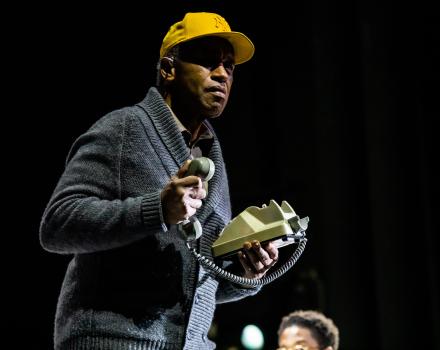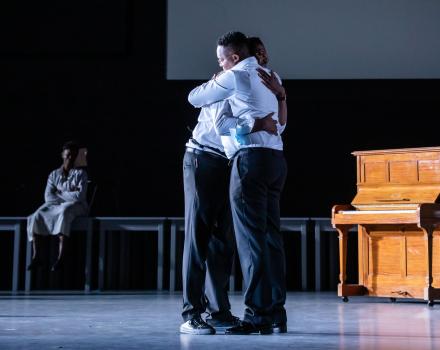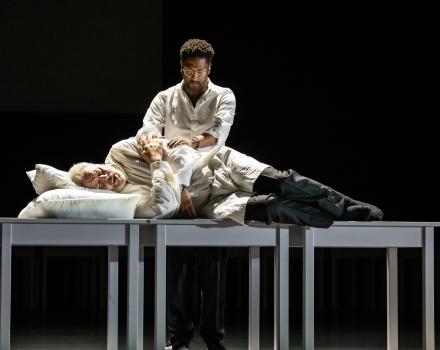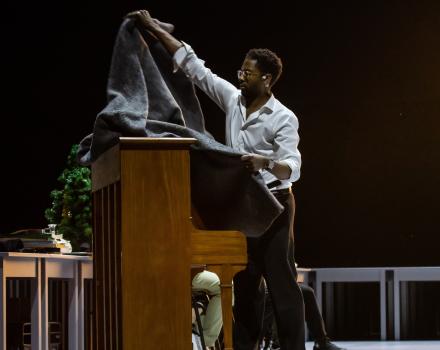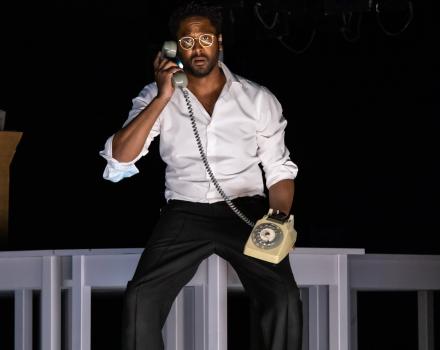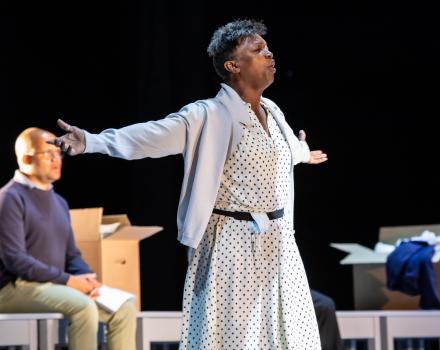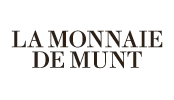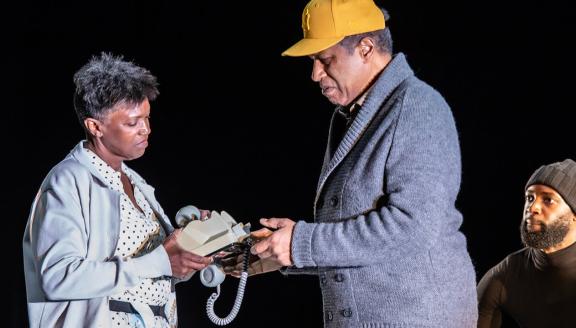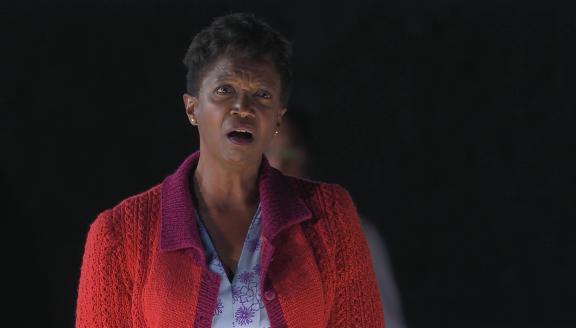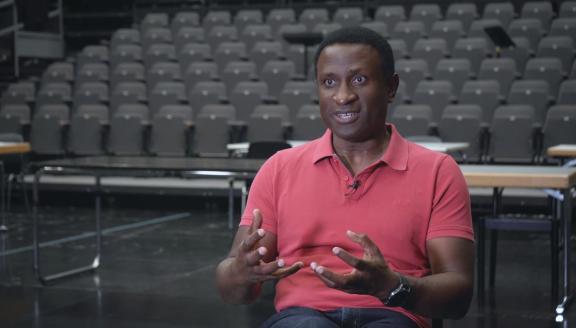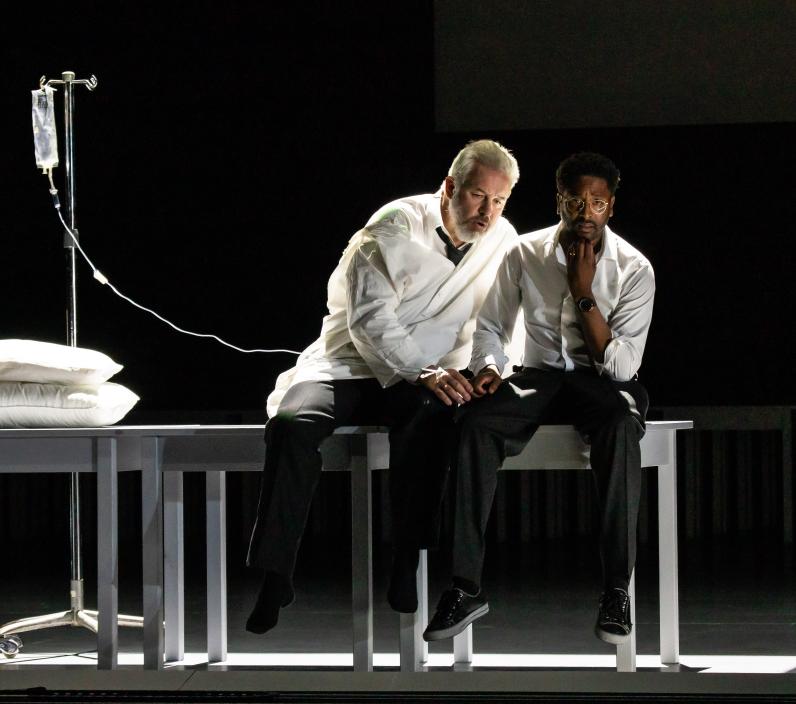

During Marian Anderson's historic concert in front of the Lincoln Memorial in 1939, a white man and a black woman fall in love. During the turbulent half-century that follows, they try to protect their three musically gifted children from prejudices they themselves have suffered.
La Monnaie / De Munt received the World Premiere Award for The Time of Our Singing at the International Opera Awards 2022. Belgian avant-garde jazz pianist and composer Kris Defoort’s new opera is a fascinating symbiosis between jazz and classical music deeply rooted in the now. Inspired by Richard Powers' great American novel, The Time of Our Singing tells the story of a mixed-race family against the backdrop of racial segregation in the USA. In the world premiere at La Monnaie, Ted Hoffman's production lets official history and intimate stories collide to explore issues of identity, race and art. Watch this production on OperaVision or catch it in Theater St Gallen (coproducer) in March 2023 and in a revival at La Monnaie in October 2024.
Cast
|
Delia Daley
|
Claron McFadden
|
|---|---|
|
William Daley
|
Mark S. Doss
|
|
David Strom
|
Simon Bailey
|
|
Jonah
|
Levy Sekgapane
|
|
Joey
|
Peter Brathwaite
|
|
Ruth
|
Abigail Abraham
|
|
Lisette Soer
|
Lilly Jørstad
|
|
Students
|
Chloé Bryan, Issaïah Fiszman, Eva Rose Thys
|
|
Pianists
|
David Zobel
|
|
Chorus
|
La Monnaie's Children's and Youth Choir and other children from Brussels, led by Benoît Giaux
|
|
Orchestra
|
La Monnaie Chamber orchestra, Jazz quartet (Mark Turner, Lander Gyselinck, Nicolas Thys, Hendrik Lasure)
|
| ... | |
|
Music
|
Kris Defoort
|
|---|---|
|
Text
|
Peter van Kraaij, based on the novel by Richard Powers
|
|
Conductor
|
Kwamé Ryan
|
|
Director
|
Ted Huffman
|
|
Sets
|
Johannes Schütz
|
|
Lighting
|
Bernd Purkrabek
|
|
Costumes
|
Astrid Klein
|
|
Film Director live recording
|
Anaïs Spiro
|
| ... | |
Videos
The story
ACT I
I. Easter 1939
African-American singer Marian Anderson performs at the Lincoln Memorial in Washington, D.C. Among the 75,000 people who attend this legendary concert are Delia Daley and David Strom, who fall in love. But she is black, and he is white and Jewish. To Delia, skin colour doesn't matter - something her father, William, can't understand. He has raised her to be an independent woman, and now he must accept that she is going her own way.
II. Nest
Delia and David have married for love, but they are learning what it means to be a mixed couple. They have their first child, Jonah, soon followed by a second son, Joey. They hope to raise their children in their own way, so that they are free to make their own choices.
III. The World is ending: Delia is expecting her third child
Delia is expecting her third child. On the news, all you hear about is the atomic bomb that fell on Hiroshima; the war is coming to an end.
In despair, Delia wonders if her husband's research has contributed to this total annihilation. David, stunned, receives a letter in which William blames him for the second atomic bomb.
Delia and David invite William to discuss the matter. The young parents want to homeschool far away from racial issues. But for William, denying skin colour is like denying black identity. He leaves, slamming the door.
And so, without the help of her family, Delia gives birth to a daughter, Ruth.
IV. The school of life
Unlike her brothers, Ruth identifies strongly with her black roots. The inequality between blacks and whites revolts her. Jonah asks his mother not to send him away to pursue his musical training, or at least not without Joey. Delia gathers the family around the piano: as usual, they sing and improvise together - a moment of perfect harmony.
V. The music school
Autumn 1952: Jonah goes to the Academy of Music, where Joey joins him a year later. The boys learn to survive at the school. Jonah falls in love, but a mixed-race boy is not allowed to date a white girl. Both brothers feel like freaks: if they were completely black, things would be clearer. Jonah wonders whether it is right for them to be involved in classical music - white music par excellence.
David suddenly picks up his sons from school: their mother has died in a fire.
ACT II
VI. Turning to dust
David and his children mourn Delia. The sense of harmony and security that the family had previously known is gone. Ruth refuses to let her father console her. She does not believe that the fire in which her mother died was accidental.
VII. Life begins again
Jonah wants to enter a big singing competition, but he doesn't want to perform without his brother, who is the only one who can really accompany him, even if it means that Joey has to give up his studies.
VIII. Bliss
Joey recounts Jonah's triumph at the contest. In the room, time stands still in a moment of absolute bliss - as if their mother Delia were present.
IX. An education
Following the competition, Jonah meets Lisette Soer, a young and beautiful diva. She urges him to perform as often as possible and to conquer the world of music. They soon become lovers.
X. Christmas 1962
Ruth wonders how her mother felt about being black. Ruth and Jonah's differences of opinion escalate. Moreover, Jonah is held up at a concert and will not be attending the Jobs and Freedom March. Ruth criticises her father's past choices - as if she blames him for their mother's death: by marrying a black woman, has he not made her a target? David is baffled: have he and Delia been so wrong?
XI. One day...
August 1963: Martin Luther King addresses the crowd during the March for Jobs and Freedom. Lisette makes it clear to Jonah that she has already terminated her pregnancy.
XII. Watts recorded
August 1965 in Los Angeles: Jonah listens in the studio to his recording of Purcell's works, while Joey reads a review of their concert at Carnegie Hall.
Outside, riots break out after a drunk driver is arrested. Jonah mingles with the crowd; he is injured. Joey catches up with him and protects him with his body.
XIII. Ruth and Robert
Ruth introduces Joey to her husband, Robert Rider, with whom she has joined the Black Panthers. She also shows him the police report on the fire at the family home. As she had always suspected, it mentions criminal intent - something their father was never willing or able to admit.
XIV. A way out
Joey tells Jonah about the police report and informs him of Ruth's marriage to a Black Panther. Jonah is asked to play a black man in a new MET production. He is honoured but refuses to be stereotyped before his operatic career has even begun.
April 1968: the brothers learn that Martin Luther King has been assassinated and that race riots have broken out in several American cities. Jonah feels that it is time for him to leave the United States and pursue his career in Europe. But this time Joey will not follow him.
ACT III
XV. Intensive care
Joey visits his dying father in hospital. Here is an opportunity to finally speak openly. Before he dies, David gives Joey a message for Ruth: '...the wavelength is different depending on where you point your telescope.'
XVI. Depression
Joey empties the father's flat alone: Ruth has been on the run with Robert for months, and Jonah is unreachable on tour. The phone rings; it is Jonah, who only then learns of their father's death. He wants to convince Joey to go to Europe. Ruth unexpectedly appears to announce that Robert is dead, shot during a police check.
XVII. Philadelphia
William receives Joey at his home. Joey tells Ruth about their father's message, but she doesn't care for his cryptic words. It is too much of a contrast to the life she leads. Jonah calls from Europe, still hoping to persuade his brother to come, but Joey has made up his mind: he wants to help Ruth with the school she has started.
XVIII. Deep River
After the death of his grandfather, Joey joins Ruth in Oakland to teach music at her school. For the first time in his life, he feels he is doing useful work. Despite Joey's insistence, she refuses to attend Jonah's first American tour.Joey invites Jonah to their school where he makes music with young people while learning about their own musical culture. Ruth unexpectedly appears to announce that Robert is dead, shot during a police check.
XVII. Philadelphia
William receives Joey at his home. Joey tells Ruth about their father's message, but she doesn't care for his cryptic words. It is too much of a contrast to the life she leads. Jonah calls from Europe, still hoping to persuade his brother to come, but Joey has made up his mind: he wants to help Ruth with the school she has started.
XVIII. Deep River
After the death of his grandfather, Joey joins Ruth in Oakland to teach music at her school. For the first time in his life, he feels he is doing useful work. Despite Joey's insistence, she refuses to attend Jonah's first American tour. Joey invites Jonah to their school where he makes music with young people while learning about their own musical culture. Jonah is critical of the musical stereotypes he believes Joey's work reflects...
XIX. We were singing
... but his curiosity leads him to Ruth and Joey's school. Joey is in the middle of rehearsing with a group of students who are improvising on the musical themes he suggests. On the threshold of the classroom, Jonah, amazed, starts to sing with them - but this time he follows Joey, not the other way around.
XX. Back in the middle of it all
April 1992: The police officers who beat up Rodney King are acquitted. Riots break out in Los Angeles. In a hotel room in this city, Jonah watches the television broadcast of the events. He was himself seriously injured: he had mingled with the black demonstrators and been shot. For once, he wanted to do the right thing. He phones Joey to tell him, mostly with the intention of Ruth knowing.
He hangs up and dies, alone, in front of the flickering television screen.
Insights
Kris Defoort's musical universe: from jazz to opera
by Bernard Foccroulle
The Time of Our Singing is Kris Defoort's fourth opera, following The Woman Who Walked into Doors (2001), House of the Sleeping Beauties (2009) and Daral Shaga (2014). These four operas are very different from each other, but they have strong similarities. The first of these is 'institutional': for more than twenty years Kris Defoort has had a privileged relationship with the Flemish company LOD muziektheater, which co-produces each of his operas. La Monnaie has also participated in three of these projects, ensuring the world premiere of the second and fourth. This double partnership, together with LOD's international network, has enabled Kris Defoort's operas to enjoy an impressive number of performances in several European countries and in Japan.
FIRST-CLASS LITERARY SOURCES
For each of his operas, Kris Defoort has chosen a writer with a strong personality, a key work, a unique world and a specific cultural background. Kris Defoort was so impressed by The Time of Our Singing (2003) that he quickly contacted Richard Powers to obtain the rights to turn it into an opera. He soon obtained the writer's agreement, having sent recordings of his jazz concerts and previous operas. The epic novel tells the story of a family consisting of a black mother, a German-Jewish father who fled Nazism and three children. The children are immersed in music, Jonah embarks on an international career as a tenor, Joseph becomes his brother's piano accompanist, and Ruth, the youngest, joins the Black Panther movement. The novel carries many themes that could not fail to appeal to the composer; it covers half a century of American history, it evokes in exceptional detail a millennium of Western classical music and jazz, it addresses issues of hybridity (racial and musical), it questions the possibility of a world free of racism, it relentlessly raises the question of the role of music, both in the family and in society... Few books have dealt with the complex relationship between music and society with such relevance and depth.
This book coincides in many ways with Kris Defoort's own life: a classical musician with a passion for baroque music, who became a jazz pianist, improviser and composer, and a European who lived for several years in New York, Kris found in it a mirror of his own passions, obsessions and questionings.The literary sources of inspiration for the four operas are extremely diverse. However, there are two points in common. First of all, none of them is a play. They are novels that had to be rewritten: they had to be given the material and form of an opera libretto. For The Time of Our Singing, Peter van Kraaij was asked to write the libretto, which he did in conjunction with the composer.
A VERY SINGULAR MUSICAL JOURNEY
Musically speaking, Kris Defoort's itinerary is certainly atypical. After studying the recorder and baroque music, Kris came to jazz and studied at the conservatories of Antwerp and Liège, where he met such different personalities as Barthold Kuijken, Koen Dieltiens, Jos Van Immerseel, Henri Pousseur, Garret List, Frederic Rzewski, Dennis Luxion and Philippe Boesmans. He then spent three years in New York, where he studied jazz piano with Fred Hersch and earned his living by taking part in a six-month tour with Lionel Hampton and his Big Band. This does not necessarily lead to a career as an opera composer!
WAITING FOR THE TIME OF OUR SINGING
All of the above suggests that Kris Defoort's fourth opera, The Time of Our Singing, will be the climax and culmination of his twenty years of operatic composition. Richard Powers' novel brings together concerns dear to the composer, and gives him the opportunity to explore the history of Western music and jazz. It will be fascinating to discover how the American author's moving characters find a musical and scenic incarnation in this work. In the space of two decades Kris Defoort has established himself as a remarkable composer. Each of his forays into the world of opera has been marked by a deep sense of theatricality, by a strong desire to work as a team, by a willingness to establish a fertile dialogue with the director and the playwright, as well as with all the performers, especially the conductors - characteristics that will not fail to be found in the present work. Moreover, the world view of this particularly cultured, free and sensitive musician never ceases to nourish his creation. In this respect, each of his operas is an infinitely precious testimony to our times, to the human condition today. Each of his works joyfully, deeply and densely combines music and life.
Gallery
